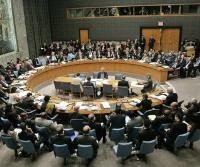The United Nations General Assembly meets today to elect five new nonpermanent members of the Security Council. Although the winners will not begin their terms until January, the U.N. is approaching the end of two turbulent years in which three major powers -- Germany, India and South Africa -- have held temporary seats in the council, playing prominent roles in its debates over Libya and Syria. All three aspire to permanent seats in the forum, but have no choice but to head for the exit. (Colombia and Portugal are also off.)
When the trio of powers won seats on the council two years ago, Bruce D. Jones and I warned in these pages that there was no guarantee that they would cooperate easily with the council’s five permanent members: the U.S, China, France, Russia and the U.K., collectively known as the P5. But we also argued that their presence could restore real credibility to the council, which has repeatedly been criticized for failing to adapt to changing global power dynamics. At the time, it seemed that the U.N. agenda would be dominated by African issues, such as South Sudan’s transition to independence and elections in Liberia and the Democratic Republic of the Congo. There was no reason to think that such matters would create major rifts in New York.
Events didn’t turn out that way. The Arab Spring put the Security Council in the limelight and threw it into confusion. Germany shocked the U.S., France and Britain by refusing to vote for military action in Libya in March 2011. While Berlin hastened to undo the diplomatic damage, India and South Africa attempted to carve out an independent position over the mounting crisis in Syria in collaboration with Brazil, which sat on the council from 2010 to 2011.

